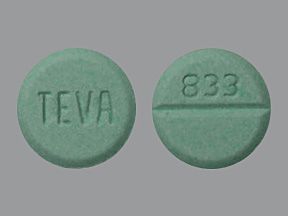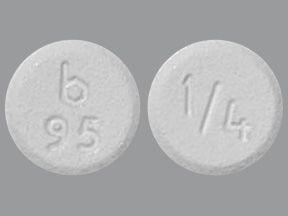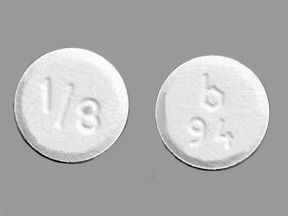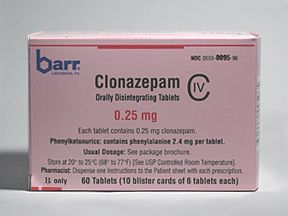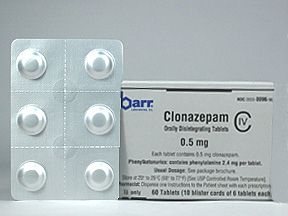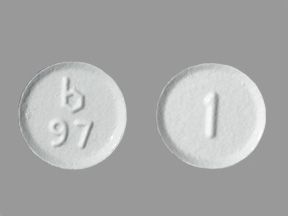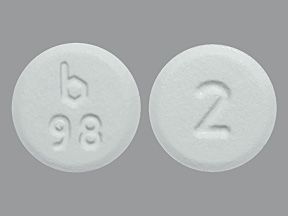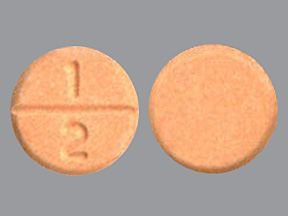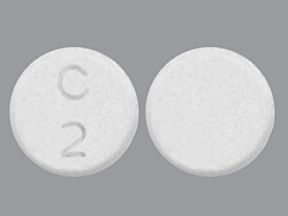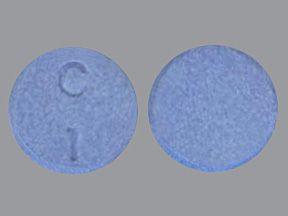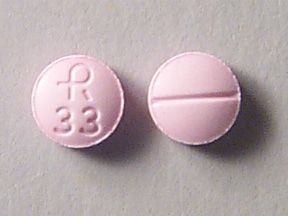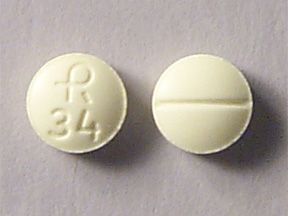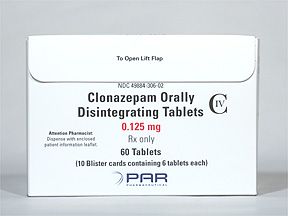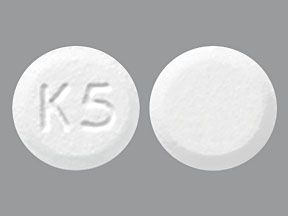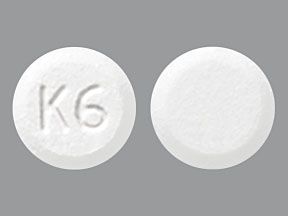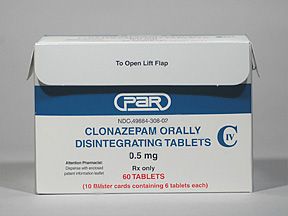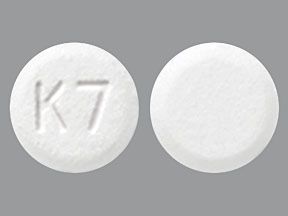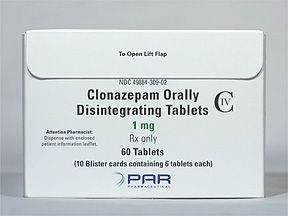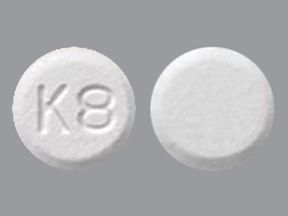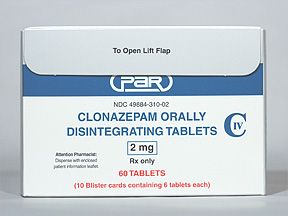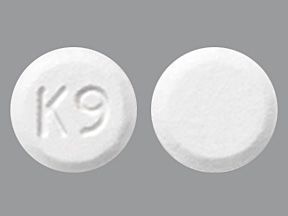- Clonazepam oral tablet is available as a generic drug and a brand-name drug, Klonopin.
- Clonazepam comes as both an oral tablet and an oral disintegrating (dissolving) tablet.
- Clonazepam is used to treat panic disorder and seizures.
Clonazepam oral tablet is a prescription drug that’s available as the brand-name drug Klonopin. It’s also available as a generic drug. Generic drugs usually cost less. In some cases, they may not be available in every strength or form as the brand-name version.
Clonazepam comes as both an oral tablet and an oral disintegrating (dissolving) tablet.
Clonazepam is a controlled substance.
Why it’s used
Clonazepam is used to treat panic disorder. It’s also used to stop seizures.
Clonazepam may be used as part of a combination therapy. This means a person may need to take it with other medications.
How it works
Clonazepam belongs to a class of drugs called benzodiazepines. A class of drugs is a group of medications that work in a similar way. These drugs are often used to treat similar conditions.
Clonazepam works by increasing the activity of gamma aminobutyric acid (GABA). This is a chemical that sends signals throughout a person’s nervous system. If a person does not have enough GABA, their body may be in an excited state. This may cause them to have panic attacks or seizures. When a person takes this drug, they will have more GABA in their body. This will help them have fewer panic attacks and seizures.
Clonazepam can cause mild or serious side effects. The following list contains some of the key side effects that may occur while taking clonazepam. This list does not include all possible side effects.
For more information on the possible side effects of clonazepam, or tips on how to deal with a troubling side effect, a person should talk with their doctor or pharmacist.
Common side effects
The more common side effects of clonazepam oral tablet can include:
- drowsiness
- problems with walking and coordination
- dizziness
- depression
- fatigue
- problems with memory
If these effects are mild, they may go away within a few days or a couple of weeks. If they’re more severe or don’t go away, a person should talk to their doctor or pharmacist.
Serious side effects
A person should call their doctor right away if they have serious side effects. They should call 911 if their symptoms feel life-threatening or if they think they are having a medical emergency. Serious side effects and their symptoms can include the following:
- depressed mood or thoughts of suicide (harming themself)
- seizures (these are more likely to happen if a person stops taking this drug too quickly, or if they already have a seizure disorder)
The clonazepam dosage a doctor prescribes will depend on several factors. These include:
- the type and severity of the condition the person is using clonazepam to treat
- the person’s age
- the form of clonazepam they take
- other medical conditions they may have
Typically, a doctor will start a person on a low dosage and adjust it over time to reach the dosage that’s right for them. They’ll ultimately prescribe the smallest dosage that provides the desired effect.
The following information describes dosages that are commonly used or recommended. However, a person should be sure to take the dosage the doctor prescribes for them.
A doctor will determine the best dosage to suit a person’s needs.
Forms and strengths
Generic: Clonazepam
- Form: oral tablet
- Strengths: 0.5 mg, 1 mg, 2 mg
- Form: oral disintegrating tablet
- Strengths: 0.125 mg, 0.25, 0.5 mg, 1 mg, 2 mg
Brand: Klonopin
- Form: oral tablet
- Strengths: 0.5 mg, 1 mg, 2 mg
Dosage for panic disorder
Adult dosage (ages 18 to 64 years)
- Typical starting dose: 0.25 mg taken twice per day
- Dose increases: A doctor may increase the dose to 0.5 mg taken two times per day after three days.
- Maximum dose: 4 mg per day.
- Dose reduction: A doctor should decrease a person’s dose slowly when stopping treatment with this drug. They should decrease the dose by no more than 0.125 mg every three days. For example, if the person was taking 2 mg two times per day, their doctor would start by decreasing the dose to 1.875 mg, taken two times per day.
Child dosage (ages 0 to 17 years)
It hasn’t been confirmed that clonazepam is safe and effective for use in people younger than 18 years for this condition.
Senior dosage (ages 65 years and older)
The kidneys of older adults may not work as well as they used to. This can cause their body to process drugs more slowly. As a result, more of a drug stays in their body for a longer time. This raises their risk of side effects. Their doctor may start them on a lowered dose or a different dosing schedule. This can help keep levels of this drug from building up too much in their body.
Dosage for seizures
Adult dosage (ages 18 to 64 years)
- Typical starting dose: 0.5 mg taken three times per day
- Dose increases: A doctor may increase a person’s dose by 0.5 to 1 mg every three days until their seizures are controlled.
- Maximum dose: 20 mg per day, taken in divided doses.
Child dosage (ages 11 to 17 years)
- Typical starting dose: 0.5 mg taken three times per day
- Dose increases: A doctor may increase a child’s dose by 0.5 to 1 mg every three days until their seizures are controlled.
- Maximum dose: 20 mg per day, taken in divided doses.
Child dosage (ages 0 to 10 years or children who weigh 66 lbs. [30 kg] or less)
- Typical starting dose: 0.01 to 0.03 mg/kg of body weight per day. The dose shouldn’t be more than 0.05 mg/kg per day given in two to three divided doses.
- Dose increases: A doctor may increase a child’s dose by 0.25 to 0.5 mg every three days until their seizures are controlled.
- Maximum dose: 0.1–0.2 mg/kg per day taken in divided doses.
Senior dosage (ages 65 years and older)
The kidneys of older adults may not work as well as they used to. This can cause their body to process drugs more slowly. As a result, more of a drug stays in their body for a longer time. This raises their risk of side effects. Their doctor may start them on a lowered dose or a different dosing schedule. This can help keep levels of this drug from building up too much in their body.
Clonazepam oral tablet is used for short-term treatment. It comes with risks if a person does not take it as prescribed.
If a person stops taking the drug suddenly or doesn’t take it at all: If a person does not take this drug, their panic disorder or seizures won’t get better and may get worse. If they stop taking it suddenly, they may have symptoms of withdrawal. These include irritability, trouble sleeping, and anxiety.
If a person misses doses or doesn’t take the drug on schedule: They may have withdrawal symptoms if they don’t take the drug on schedule.
If a person takes too much: They could have dangerous levels of the drug in their body. Symptoms of an overdose of this drug can include:
- sleepiness or drowsiness
- confusion
- trouble with coordination or slow reflexes
- coma (being unconscious for a long time)
If a person thinks they have taken too much of this drug, they should call their doctor or local poison control center. If their symptoms are severe, they should call 911 or go to the nearest emergency room right away.
What to do if a person misses a dose: A person usually should take a missed dose as soon as they remember. But if they remember just a few hours before their next scheduled dose, take only one dose. They should never try to catch up by taking two doses at once. This could result in dangerous side effects.
How to tell if the drug is working: A person should have fewer panic attacks or seizures.
This drug comes with several warnings.
FDA warnings
- This drug has a black box warning. This is the most serious warning from the Food and Drug Administration (FDA). A black box warning alerts doctors and patients about drug effects that may be dangerous.
- Using clonazepam with opioid drugs can cause dangerous effects. These can include severe drowsiness, slowed breathing, coma, and death. If your doctor prescribes clonazepam with an opioid, they will monitor you closely. Examples of opioids include hydrocodone, codeine, and tramadol.
- Risk of dependence: Using Clonazepam, even as prescribed, can lead to physical dependence and withdrawal if you stop taking the drug suddenly. Withdrawal can be life threatening. Taking this drug can also lead to misuse and addiction. Misuse of Clonazepam increases your risk of overdose and death.
- Follow the prescription: Only take this drug as your doctor prescribes. Talk with your healthcare provider if you have any concerns about safely taking this drug.
Slowed response time warning
Clonazepam is a central nervous system (CNS) depressant. This type of drug can slow down the brain’s activity and interfere with a person’s judgment, thinking, and reaction time. A person should not drink alcohol or use other drugs that can also slow down their brain’s activity while they are taking this medication. They also shouldn’t drive, use machinery, or do other activities that require alertness until they know how this drug affects them.
Suicidal thoughts and behavior
Clonazepam can increase the risk of suicidal thoughts or behavior (thoughts or actions of harming oneself). A person should tell their doctor if they have worsening depression, suicidal thoughts or behavior, or any unusual changes in mood or behavior.
Alcohol interaction
The use of drinks that contain alcohol can increase a person’s risk of sedative effects from clonazepam. A person may have slowed reflexes, poor judgment, and sleepiness. This can be dangerous. If a person drinks alcohol, they should talk to their doctor.
Allergy warning
Clonazepam can cause a severe allergic reaction. Symptoms can include:
- trouble breathing
- swelling of the throat or tongue
If a person has an allergic reaction, they should call their doctor or local poison control center right away. If their symptoms are severe, call 911 or go to the nearest emergency room. A person should not take this drug again they have ever had an allergic reaction to it. Taking it again could be fatal (cause death).
Warnings for people with certain health conditions
For people with depression: A person’s depression might get worse while they are taking this drug. If a person has worsening symptoms of depression or any suicidal thoughts (thoughts of harming themself), call the doctor right away.
For people with acute narrow angle glaucoma: A person should not take this drug if they have acute narrow angle glaucoma. It can make the condition worse.
For people with liver disease: If a person has liver problems, their body may not be able to clear this drug well. This can cause the drug to build up in the body. This puts them at a higher risk for side effects.
Warnings for other groups
For pregnant women: Clonazepam is a category D pregnancy drug. That means two things:
- Studies show a risk of adverse effects to the fetus when the mother takes the drug.
- This drug should only be used during pregnancy in serious cases where it’s needed to treat a dangerous condition in the mother.
A person should talk to their doctor if they are pregnant or planning to become pregnant. This drug should be used only if the potential benefit justifies the potential risk to the fetus. A person should call their doctor right away if they become pregnant while taking this drug.
For women who are breastfeeding: Clonazepam passes into breast milk and causes side effects in a child who is breastfed. A person should talk to their doctor if they breastfeed their child. They may need to decide whether to stop breastfeeding or stop taking this medication.
For seniors: The kidneys of older adults may not work as well as they used to. This can cause their body to process drugs more slowly. As a result, more of a drug stays in their body for a longer time. This raises their risk of side effects.
For children: This medication hasn’t been studied in children with panic disorders. It shouldn’t be used for the treatment of this condition in people younger than 18 years.
Clonazepam can interact with several other medications. Different interactions can cause different effects. For instance, some can interfere with how well a drug works, while others can cause increased side effects.
Below is a list of medications that can interact with Clonazepam. This list does not contain all drugs that may interact with Clonazepam.
Before taking Clonazepam, a person should be sure to tell their doctor and pharmacist about all prescription, over-the-counter, and other drugs they take. They should also tell them about any vitamins, herbs, and supplements they use. Sharing this information can help avoid potential interactions.
If a person has questions about drug interactions that may affect them, they should ask their doctor or pharmacist.
Drugs that increase the risk of side effects
Taking clonazepam with certain other medications may cause more side effects. Examples of these drugs include:
- Benzodiazepines, such as lorazepam, clonazepam, triazolam, and midazolam. A person may feel more sedated and drowsy.
- Opioids, such as codeine and hydrocodone. Taking these drugs with clonazepam puts a person at serious risk of severe drowsiness, slowed breathing, coma, or death.
- Barbiturate and nonbarbiturate sleep drugs, such as amobarbital, butabarbital, eszopiclone, pentobarbital, zaleplon, and zolpidem. A person may feel more sedated and drowsy.
- Other drugs used to treat anxiety, such as buspirone and hydroxyzine. A person may feel more sedated and drowsy.
- Tricyclic antidepressants, such as amitriptyline and nortriptyline. A person may feel more sedated and drowsy.
- Other drugs used to treat seizures, such as gabapentin and pregabalin. A person may feel more sedated and drowsy.
Keep these considerations in mind if a doctor prescribes clonazepam oral tablet.
General
- A person can take clonazepam with or without food.
- They should take this drug at the times recommended by a doctor.
- A person can cut or crush the tablet.
- Not every pharmacy stocks this drug. When filling a prescription, be sure to call ahead.
Storage
- Store clonazepam between 59°F and 86°F (15°C and 30°C).
- Don’t store this medication in moist or damp areas, such as bathrooms.
Refills
A prescription for this medication is refillable. However, clonazepam is a schedule IV controlled substance. Therefore, a prescription for this drug may be refilled no more than five times. Also, a person can only get refills for six months after the date their doctor wrote the original prescription. After that time, they will need a new prescription.
Travel
When traveling with medication, a person should:
- Always carry their medication with them. When flying, they should never put it into a checked bag and instead keep it in a carry-on bag.
- Not worry about airport X-ray machines. They can’t hurt the medication.
- Always carry the original prescription-labeled box, as they may need to show airport staff the pharmacy label for their medication.
- Not put this medication in a car’s glove compartment or leave it in the car. They should be especially sure to avoid doing this when the weather is very hot or very cold.
Clinical monitoring
A person and their doctor should monitor certain health issues. This can help make sure they stay safe while they take this drug. These issues include:
- Kidney function. A doctor may do blood tests to check how well a person’s kidneys are working. If their kidneys aren’t working well, the doctor may lower the person’s dose.
- Mental health and behavioral problems. A person and their doctor should watch for any unusual changes in their behavior and mood. This drug can cause new mental health and behavior problems. It can also make problems a person already has worse.
- Seizures. If a person is taking this drug for seizures, they and their doctor should monitor the number of seizures they have.
Insurance
Many insurance companies require a prior authorization for this drug. This means a doctor will need to get approval from a person’s insurance company before the insurance company will pay for the prescription.
There are other drugs available to treat a person’s condition. Some may be better suited for that person than others. A person should talk to their doctor about other drug options that may work for them.
Disclaimer: Medical News Today has made every effort to make certain that all information is factually correct, comprehensive, and up-to-date. However, this article should not be used as a substitute for the knowledge and expertise of a licensed healthcare professional. You should always consult your doctor or other healthcare professional before taking any medication. The drug information contained herein is subject to change and is not intended to cover all possible uses, directions, precautions, warnings, drug interactions, allergic reactions, or adverse effects. The absence of warnings or other information for a given drug does not indicate that the drug or drug combination is safe, effective, or appropriate for all patients or all specific uses.


